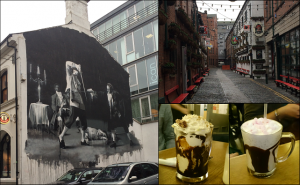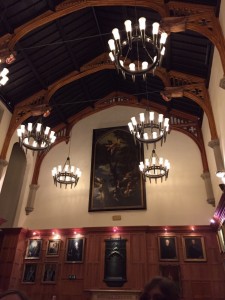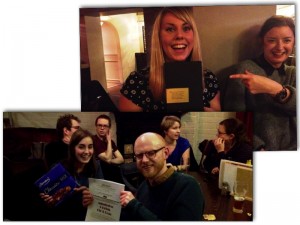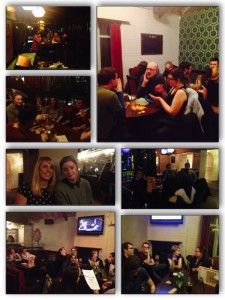By Mareike Ahlers (Archaeology PhD)
Graciously gliding across the water, swans have the uncanny ability to present a serene picture of themselves to the world above the water. Underneath the water, however, their feet are paddling frantically to keep them afloat. This sounds very much like organising a conference.
On the 20/21st November 2015, my colleague, Lucy Cummings, and I hosted the 2nd Neolithic and Early Bronze Age Research Student Symposium (NEBARSS). Full of new experiences, it was both our first go at organising a conference and our first time presenting an academic paper. You can imagine then, that this was a little daunting! Our conference was a great success. Everyone—guests, colleagues, and staff—was really pleased with how it went. Our effort and organisation certainly paid-off, but it was not without its difficulties.
Starting on Friday evening, Newcastle’s own Dr Chris Fowler gave the keynote on ontologies in Neolithic and Bronze Age Britain and Ireland, followed by a wine reception. This was a great start to the conference. The excellent keynote set the tone for the rest of the conference, and the wine reception provided the opportunity for everyone to meet. The occasion also gave the speakers the chance to loosen up and calm down any nerves with a glass of wine (or two!) … While we proceeded to stress about making dinner plans, double-checking that people had places to stay, and cleaning up and clearing everything away before rushing down to meet everyone for dinner. But the world seems much more relaxed after an amazing curry!
But the organisation does not stop there. On Saturday morning (the main day of the conference), Lucy and I met at the department well before 8am, doing more clearing and setting up coffee, biscuits and poster boards… These are wobbly A4 folding screen boards onto which we had to fit A1 posters. Just a little hiccup.
Trying to get your nerves under control throughout the morning is especially tricky if you know that your own, very first, paper is coming up in just a few minutes. While finally getting the chance to tell your audience about henges and long barrows, a little piece of paper telling you that only there are only 5 minutes remaining is vying for your attention. They seemed really off-putting! But, we are told that it happens even to the best.
After that it is finally time to relax… well, at least until lunch time. While everyone else was enjoying the delicious food platters and sandwiches, we were already starting to think about the next session: making sure that all the power point presentations are working, water is ready at the lectern to slake any sudden thirst, and the session leader has some information to use when introducing the speaker.
Finally, after the last session and when all thanks have been given, the first sip of your cold drink in the pub is the best feeling of the whole day. Everyone is happy, the conference is a success, no fatal mishaps, no wine or coffee on the carpets. You managed pass the whole day off like a swan. Time to breathe … and start thinking about the next one!



 o
o